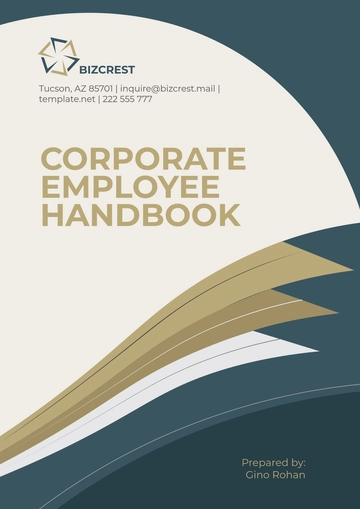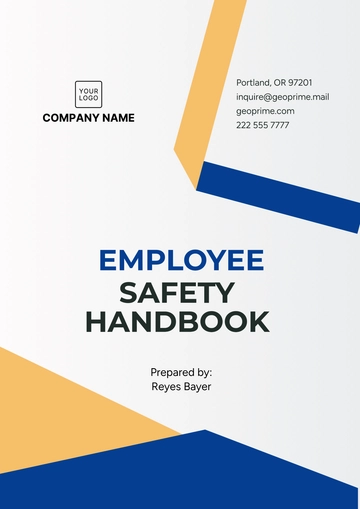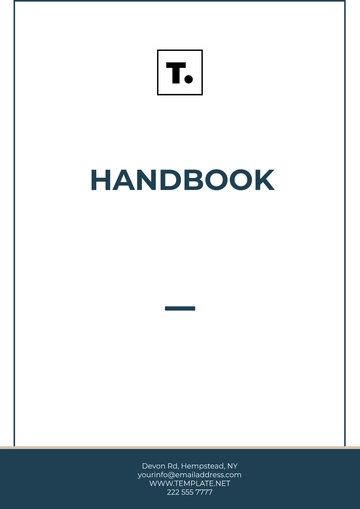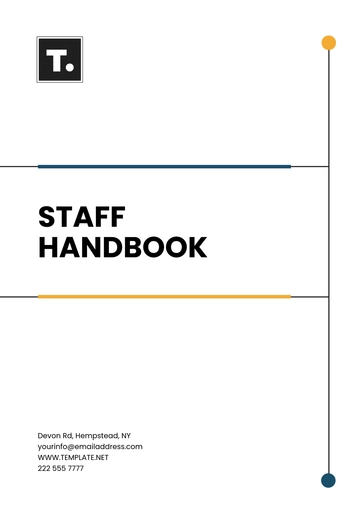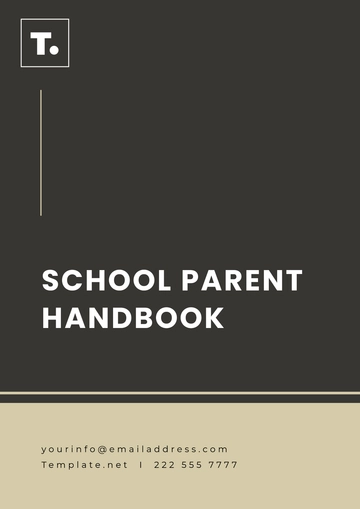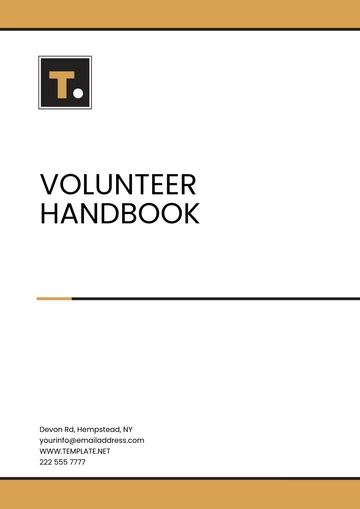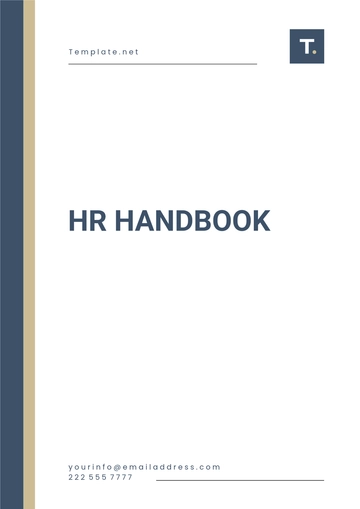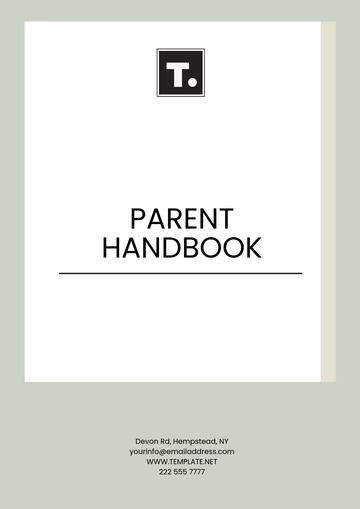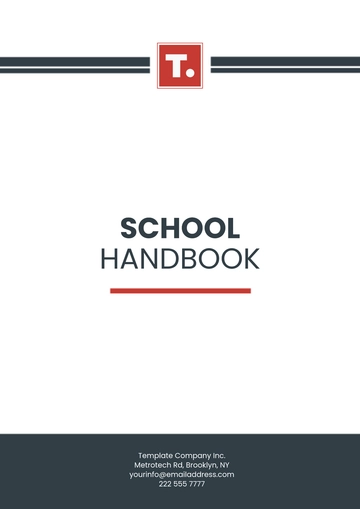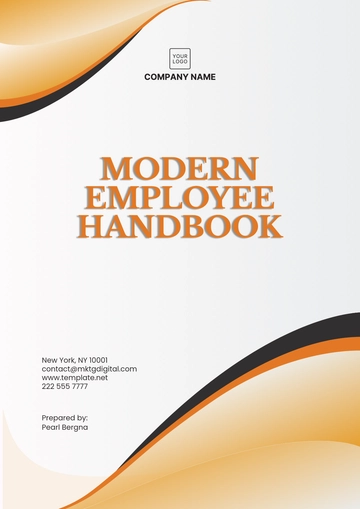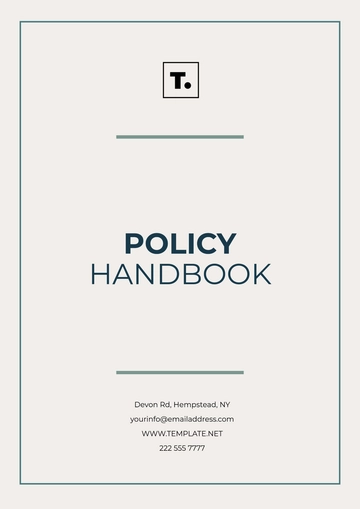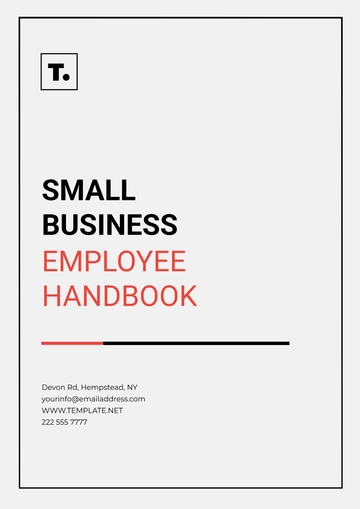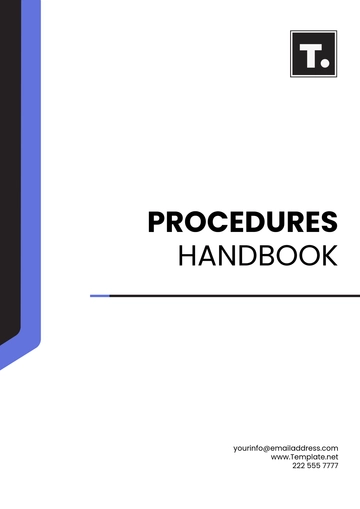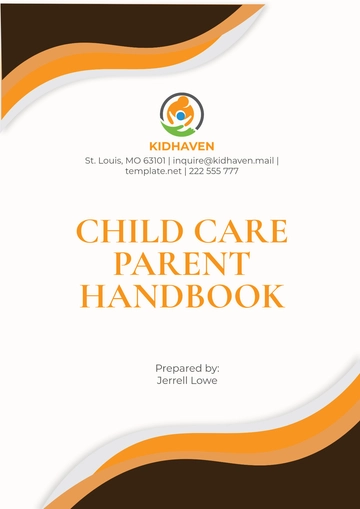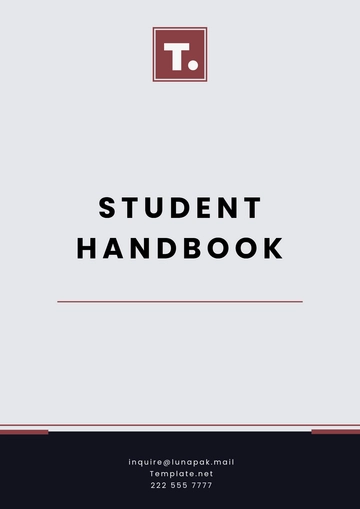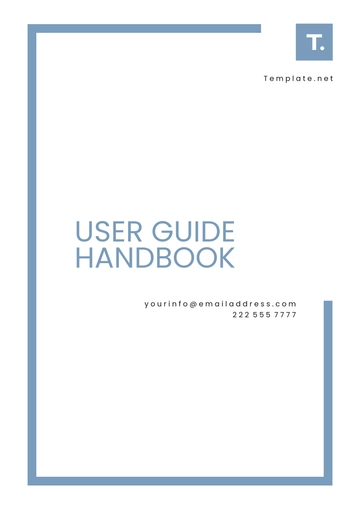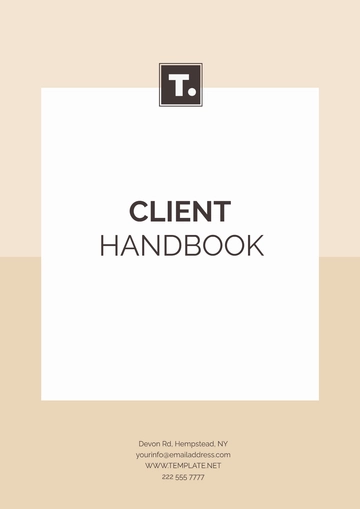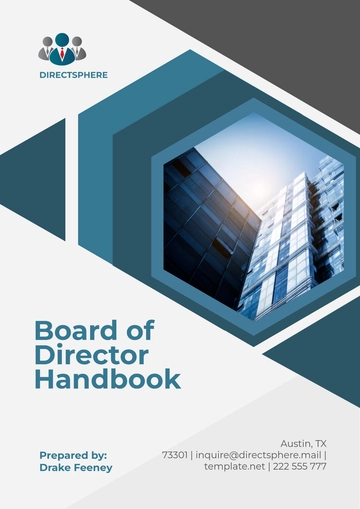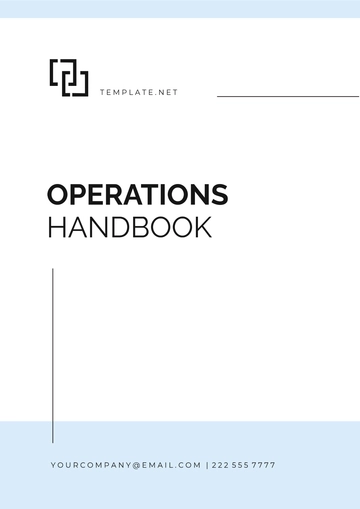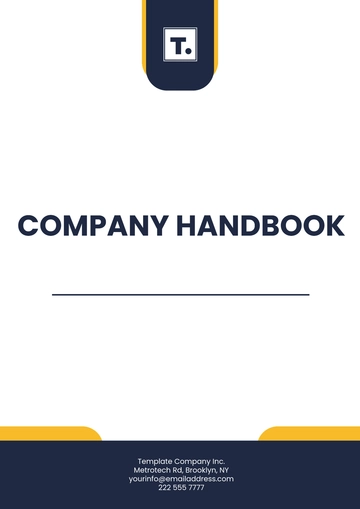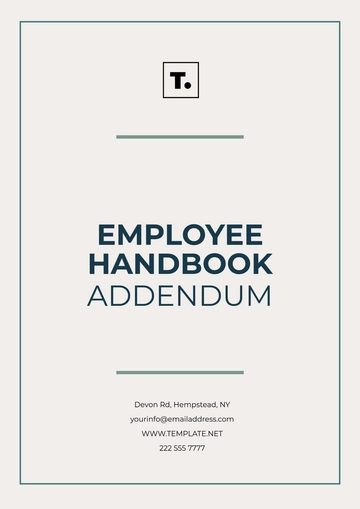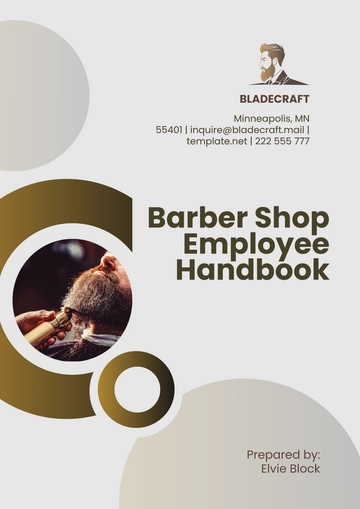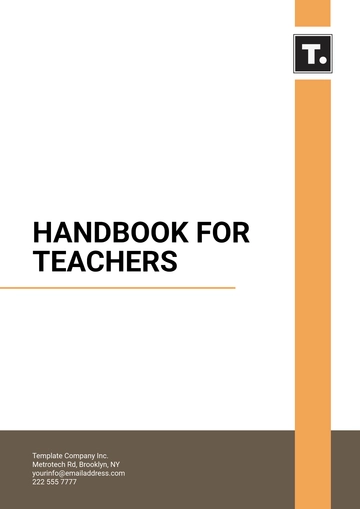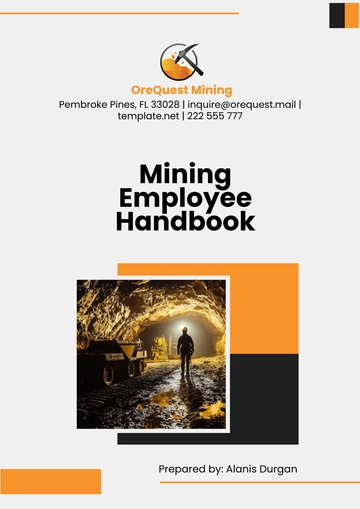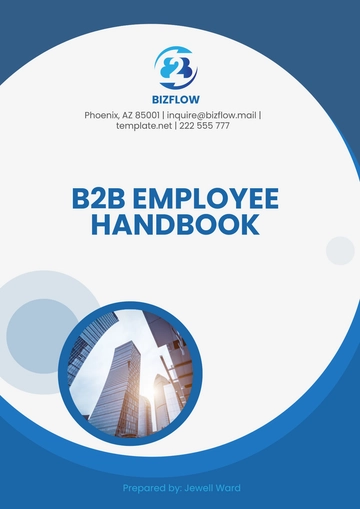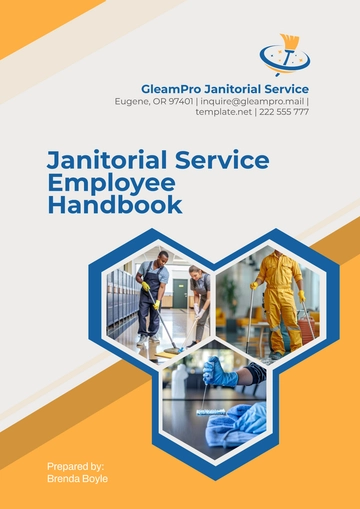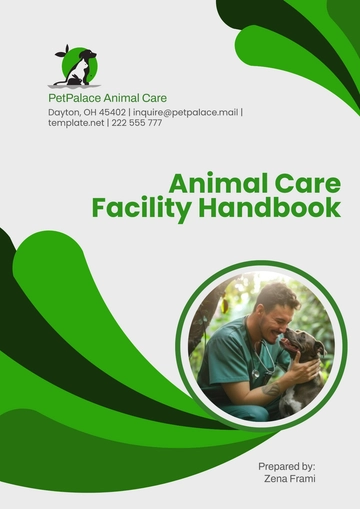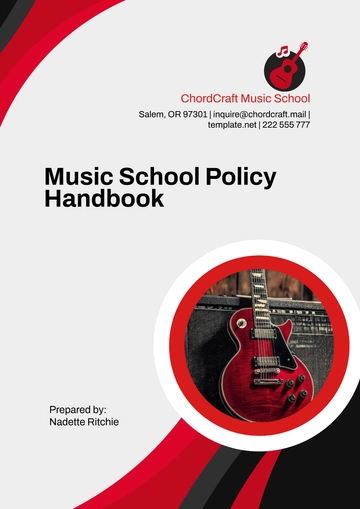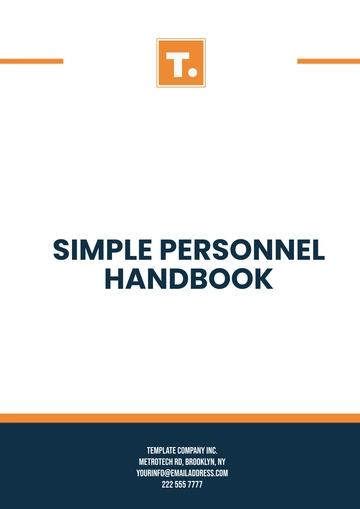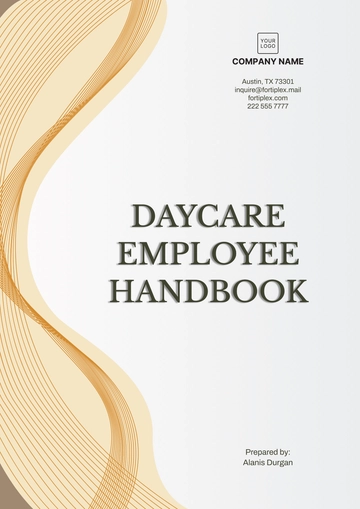Free Hotel Management Handbook
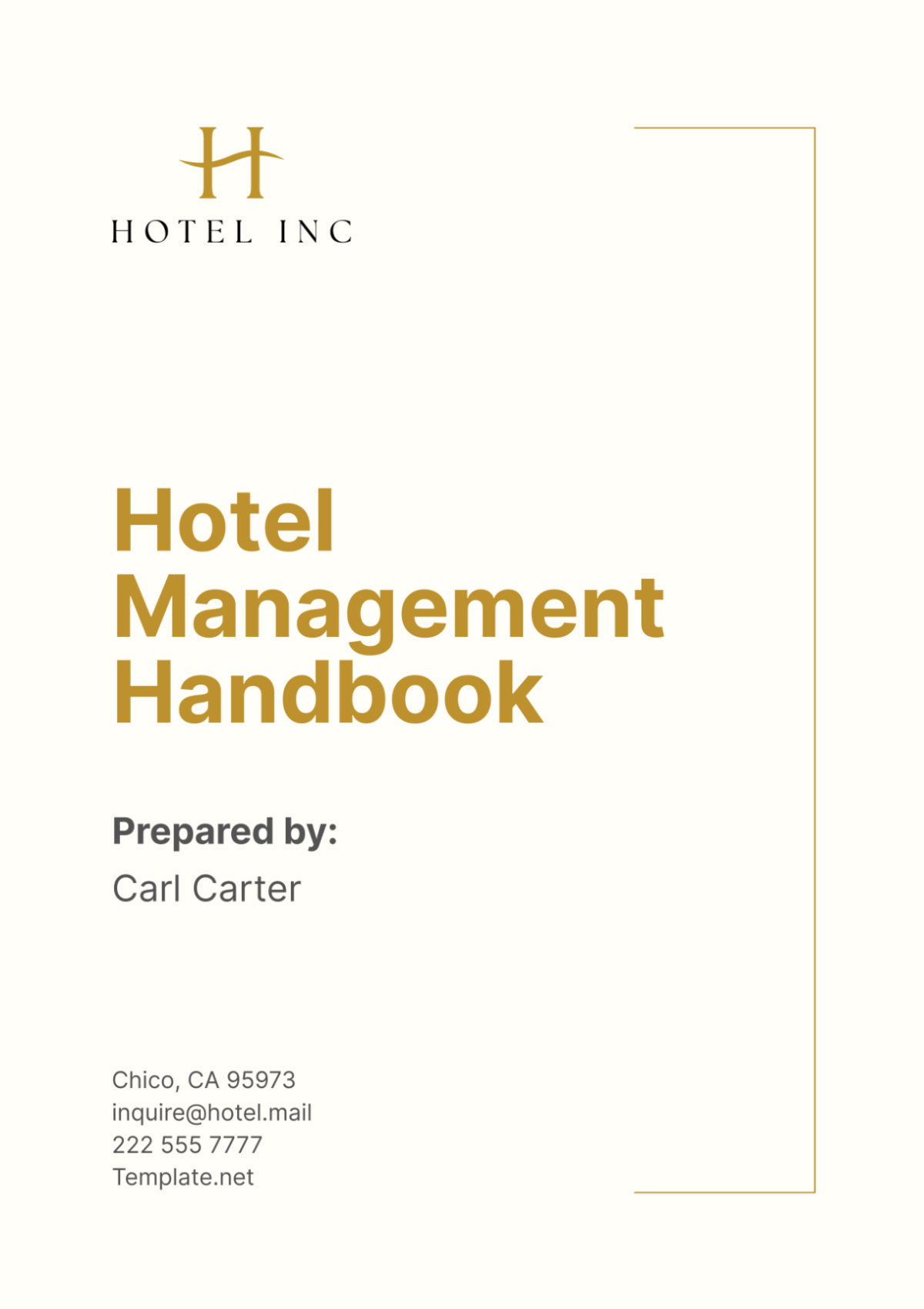
I. Introduction
A. Purpose of the Handbook
The Hotel Management Handbook of [Your Company Name] is designed to provide a comprehensive guide to the policies, procedures, and standards that govern our operations. This handbook serves as a reference for all employees, ensuring consistency in the delivery of services, adherence to regulatory requirements, and the maintenance of high-quality standards. It aims to equip managers and staff with the necessary knowledge to perform their duties effectively, fostering a professional and harmonious work environment.
B. Scope and Applicability
This handbook applies to all employees of [Your Company Name], including full-time, part-time, temporary, and contract staff. It covers all aspects of hotel management, from human resources and guest services to financial management and sustainability practices. The policies and procedures outlined herein are mandatory and must be followed by all employees to ensure the smooth operation of the hotel and the satisfaction of our guests.
C. Overview of [Your Company Name]
[Your Company Name] is a premier hospitality provider known for its commitment to excellence and personalized service. Founded in [Year], our hotel has grown to become a preferred destination for travelers seeking luxury, comfort, and unique experiences. Our property features [Number] rooms, state-of-the-art amenities, and exceptional dining options, all designed to exceed the expectations of our guests.
D. Mission and Vision
Mission: To provide unparalleled hospitality and exceptional experiences to our guests, creating memorable moments that last a lifetime.
Vision: To be a leading hotel renowned for our commitment to excellence, innovation, and sustainability, setting new standards in the hospitality industry.
II. Organizational Structure
A. Organizational Table
The organizational structure of [Your Company Name] is designed to ensure efficient management and clear lines of responsibility. Below is the current organizational table:
Position | Employee Name | Contact Information |
|---|---|---|
General Manager | [Name] | [Phone Number or Email Address] |
Front Office Manager | ||
Housekeeping Manager | ||
Food and Beverage Manager | ||
Maintenance Manager | ||
HR Manager |
B. Key Management Roles and Responsibilities
General Manager
The General Manager oversees all hotel operations, ensuring that all departments work in harmony to provide a seamless guest experience. Responsibilities include strategic planning, financial management, staff supervision, and maintaining high service standards.
Front Office Manager
The Front Office Manager is responsible for managing the front desk operations, including guest check-in and check-out, reservations, and concierge services. They ensure that guests receive prompt and courteous service and handle any guest complaints or issues.
Housekeeping Manager
The Housekeeping Manager oversees the housekeeping department, ensuring that all guest rooms and public areas are clean, well-maintained, and meet the hotel's standards of hygiene and presentation. They manage housekeeping staff, inventory, and supplies.
Food and Beverage Manager
The Food and Beverage Manager is in charge of the hotel's dining services, including restaurants, bars, and room service. Responsibilities include menu planning, staff training, inventory management, and ensuring high-quality food and beverage offerings.
Maintenance Manager
The Maintenance Manager oversees the maintenance and repair of the hotel's facilities and equipment. They ensure that the property is in good working order and that any issues are addressed promptly to avoid disruptions to guest services.
HR Manager
The HR Manager handles all human resources functions, including recruitment, employee relations, training and development, and compliance with labor laws. They play a key role in fostering a positive work environment and supporting employee well-being.
C. Departmental Overviews
Front Office
The Front Office department is the first point of contact for guests and plays a crucial role in setting the tone for their stay. Responsibilities include managing reservations, guest check-in, and check-out, handling inquiries, and providing concierge services.
Housekeeping
The Housekeeping department ensures that guest rooms and public areas are clean, comfortable, and well-maintained. This includes daily cleaning, linen changes, and special cleaning projects as needed.
Food and Beverage
The Food and Beverage department provides dining services to guests, including breakfast, lunch, dinner, and room service. The department is responsible for menu planning, food preparation, and maintaining high standards of service and quality.
Maintenance
The Maintenance department is responsible for the upkeep and repair of the hotel's facilities and equipment. This includes routine maintenance, emergency repairs, and ongoing improvements to the property.
Human Resources
The Human Resources department supports the recruitment, training, and development of hotel staff. It also manages employee relations, benefits, and compliance with labor laws and regulations.
III. Human Resources Management
A. Recruitment and Hiring Policies
At [Your Company Name], we believe that our employees are our greatest asset. Our recruitment and hiring policies are designed to attract and retain talented individuals who are committed to delivering exceptional service. We follow a fair and transparent hiring process that includes job postings, candidate screening, interviews, and background checks.
B. Employee Onboarding and Training
A comprehensive onboarding program is essential for new employees to understand our culture, policies, and expectations. Our onboarding process includes orientation sessions, job-specific training, and introductions to key team members. We provide ongoing training and development opportunities to help employees enhance their skills and advance their careers.
C. Performance Evaluation and Feedback
Regular performance evaluations are conducted to assess employee performance, provide constructive feedback, and identify opportunities for growth. Our evaluation process includes setting clear performance goals, conducting periodic reviews, and providing coaching and support to help employees achieve their objectives.
D. Employee Benefits and Compensation
We offer a competitive compensation package that includes salary, bonuses, and benefits such as health insurance, retirement plans, and paid time off. Our benefits program is designed to support the well-being of our employees and their families.
E. Employee Code of Conduct
Our Employee Code of Conduct outlines the expectations for behavior and professionalism at [Your Company Name]. Employees are expected to treat colleagues and guests with respect, maintain confidentiality, and adhere to all hotel policies and procedures. Any violations of the code of conduct are addressed promptly and fairly.
F. Health and Safety Policies
Ensuring the health and safety of our employees and guests is a top priority. We have implemented comprehensive health and safety policies, including regular safety training, emergency response procedures, and ongoing monitoring of workplace hazards. Employees are encouraged to report any safety concerns or incidents to their supervisors.
IV. Guest Services
A. Customer Service Standards
Providing exceptional customer service is at the core of our operations. Our customer service standards are designed to ensure that every guest feels valued and well-cared for. This includes prompt and courteous service, personalized attention, and a willingness to go above and beyond to meet guest needs.
B. Guest Interaction Protocols
Our guest interaction protocols guide how employees engage with guests at every touchpoint, from check-in to check-out. Employees are trained to listen actively, communicate clearly, and resolve any issues promptly and professionally.
C. Handling Guest Complaints and Feedback
Guest complaints and feedback are valuable opportunities to improve our services. We have established a clear process for handling complaints, including logging the issue, investigating the cause, and taking appropriate corrective action. We follow up with guests to ensure their satisfaction and to demonstrate our commitment to continuous improvement.
D. Special Services and Amenities
[Your Company Name] offers a range of special services and amenities to enhance the guest experience. This includes concierge services, room service, spa treatments, and recreational activities. We strive to anticipate and fulfill the unique needs of our guests to make their stay as enjoyable as possible.
E. Loyalty Programs and Membership Benefits
To reward our loyal guests, we offer a comprehensive loyalty program that provides exclusive benefits and rewards. Members earn points for each stay, which can be redeemed for free nights, upgrades, and other special offers. We regularly communicate with our loyalty program members to keep them informed about new promotions and benefits.
V. Operational Procedures
A. Front Desk Operations
The front desk is the hub of hotel operations, responsible for managing reservations, guest check-in and check-out, and providing information and assistance. Our front desk staff is trained to handle a wide range of tasks, from processing payments to arranging transportation. We use advanced property management systems to streamline front desk operations and ensure accuracy and efficiency.
B. Housekeeping Standards
Maintaining high standards of cleanliness and hygiene is essential for guest satisfaction. Our housekeeping procedures include daily cleaning of guest rooms and public areas, regular deep cleaning, and strict adherence to health and safety guidelines. Housekeeping staff are trained to use cleaning products and equipment safely and effectively.
C. Food and Beverage Service
Our food and beverage service is designed to offer guests a variety of dining options, from casual meals to fine dining experiences. We prioritize quality, freshness, and presentation in all our food and beverage offerings. Our staff is trained to provide attentive and courteous service, ensuring that every meal is a memorable experience.
D. Maintenance and Facility Management
Regular maintenance and facility management are crucial to the smooth operation of the hotel. Our maintenance team is responsible for routine inspections, preventive maintenance, and emergency repairs. We use a computerized maintenance management system (CMMS) to schedule and track maintenance activities, ensuring that all facilities and equipment are in optimal condition.
E. Security and Emergency Procedures
The safety and security of our guests and employees are paramount. We have implemented comprehensive security measures, including surveillance cameras, access control systems, and security personnel. Our emergency procedures cover a range of scenarios, from fire and medical emergencies to natural disasters.
VI. Financial Management
A. Budgeting and Financial Planning
At [Your Company Name], effective financial management is crucial to our success and sustainability. Our budgeting and financial planning processes are designed to ensure that resources are allocated efficiently, and financial goals are met. Each year, we develop a comprehensive budget that includes projected revenues, expenses, and capital expenditures. This budget serves as a financial roadmap, guiding our decision-making and helping us achieve our financial objectives.
The budgeting process involves input from all departments, ensuring that each area of the hotel has the resources it needs to operate effectively. Department heads are responsible for preparing detailed budget proposals, which are reviewed and approved by senior management. Regular financial reviews are conducted to monitor performance against the budget, identify variances, and implement corrective actions as needed.
Financial Planning Table | Q1 | Q2 | Q3 | Q4 |
|---|---|---|---|---|
Projected Revenue | $500,000 | $600,000 | $700,000 | $800,000 |
Operating Expenses | $300,000 | $320,000 | $340,000 | $360,000 |
Capital Expenditures | $50,000 | $70,000 | $60,000 | $80,000 |
Net Profit | $150,000 | $210,000 | $300,000 | $360,000 |
B. Revenue Management Strategies
Revenue management is essential to optimizing the hotel's financial performance. At [Your Company Name], we employ a range of strategies to maximize revenue, including dynamic pricing, demand forecasting, and market segmentation. By analyzing historical data and market trends, we can adjust room rates and availability to match demand, ensuring that we achieve the highest possible occupancy and revenue.
Our revenue management team uses advanced software tools to monitor booking patterns, competitor rates, and market conditions. This data-driven approach allows us to make informed decisions and implement pricing strategies that enhance our competitive position. Regular revenue meetings are held to review performance, discuss strategies, and make adjustments as needed.
C. Cost Control and Expense Management
Effective cost control is vital to maintaining profitability. At [Your Company Name], we implement rigorous expense management practices to ensure that costs are kept within budget. Each department is responsible for monitoring its expenses and identifying opportunities for cost savings. Regular financial reports are generated to track spending and highlight areas of concern.
We also conduct regular audits and reviews to ensure compliance with financial policies and procedures. By maintaining tight control over expenses, we can improve our financial performance and invest in initiatives that enhance guest satisfaction and operational efficiency.
D. Financial Reporting and Analysis
Accurate and timely financial reporting is essential for informed decision-making. At [Your Company Name], we produce a range of financial reports, including income statements, balance sheets, and cash flow statements. These reports provide insights into our financial performance and help us identify trends and areas for improvement.
Our financial analysis includes ratio analysis, trend analysis, and benchmarking against industry standards. This comprehensive approach allows us to assess our financial health, evaluate the effectiveness of our strategies, and make data-driven decisions that support our long-term goals.
VII. Marketing and Sales
A. Marketing Strategies and Campaigns
At [Your Company Name], our marketing strategies are designed to build brand awareness, attract new guests, and retain loyal customers. We use a mix of traditional and digital marketing techniques to reach our target audience and communicate our unique value proposition.
Our marketing campaigns include advertising, public relations, social media, and email marketing. Each campaign is carefully planned and executed to achieve specific objectives, such as increasing bookings during off-peak periods or promoting new services and amenities. We regularly analyze the performance of our marketing efforts to ensure that we are achieving the desired results and maximizing our return on investment.
B. Sales Techniques and Tactics
Our sales team plays a crucial role in driving revenue and building relationships with key clients. At [Your Company Name], we employ a range of sales techniques and tactics to secure bookings and generate repeat business. This includes personalized sales pitches, special promotions, and loyalty programs.
Our sales team is trained in effective negotiation and relationship-building skills, ensuring that they can close deals and maintain long-term partnerships with clients. We also use customer relationship management (CRM) software to track interactions and manage leads, enabling us to provide a personalized and proactive sales experience.
C. Online and Offline Advertising
Advertising is a key component of our marketing strategy. At [Your Company Name], we use both online and offline channels to reach our target audience and promote our hotel. Online advertising includes search engine marketing (SEM), social media ads, and display advertising. These channels allow us to target specific demographics and track the performance of our campaigns in real-time.
Offline advertising includes print ads, radio spots, and outdoor advertising. These traditional channels help us reach a broader audience and reinforce our brand presence in the local market. By using a mix of online and offline advertising, we can maximize our reach and achieve our marketing objectives.
D. Public Relations and Media Management
Effective public relations and media management are essential for building and maintaining a positive reputation. At [Your Company Name], we proactively engage with the media to generate positive coverage and manage our public image. This includes issuing press releases, organizing media events, and responding to media inquiries.
We also monitor media coverage and social media mentions to stay informed about public perception and address any issues that arise. Our public relations efforts are focused on highlighting our unique offerings, community involvement, and commitment to excellence, helping us build a strong and positive brand image.
E. Event Planning and Coordination
Event planning and coordination are important aspects of our service offering at [Your Company Name]. We host a variety of events, including corporate meetings, weddings, and social gatherings. Our event planning team works closely with clients to understand their needs and deliver a seamless and memorable event experience.
We provide a range of event services, including venue setup, catering, audio-visual equipment, and event staffing. Our team is skilled in managing all aspects of event logistics, ensuring that each event runs smoothly and exceeds client expectations.
VIII. Technology and Innovation
A. Hotel Management Software
At [Your Company Name], we leverage advanced hotel management software to streamline operations and enhance the guest experience. Our property management system (PMS) integrates all aspects of hotel management, from reservations and front desk operations to housekeeping and billing. This centralized system allows us to manage our property more efficiently and provide a seamless experience for our guests.
Our PMS also provides valuable data and insights, enabling us to make informed decisions and optimize our operations. We regularly review and update our software to ensure that we are using the latest technology and maximizing its potential.
B. Guest-Facing Technologies
We are committed to using technology to enhance the guest experience at [Your Company Name]. This includes offering convenient and user-friendly guest-facing technologies, such as mobile check-in, digital room keys, and in-room tablets. These technologies provide guests with greater control and convenience, allowing them to customize their stay and access information and services at their fingertips.
We also offer high-speed internet access, smart TVs, and other modern amenities to meet the needs of tech-savvy travelers. By staying at the forefront of technological advancements, we can provide a superior guest experience and differentiate ourselves from competitors.
C. Data Management and Security
Protecting guest data and ensuring its security is a top priority at [Your Company Name]. We implement robust data management and security practices to safeguard sensitive information and comply with regulatory requirements. This includes using encrypted storage, secure access controls, and regular security audits.
Our data management policies also ensure that we use data responsibly and ethically, respecting the privacy of our guests. We provide training to our staff on data protection best practices and monitor compliance with our security protocols.
D. Future Technology Implementations
As part of our commitment to innovation, we continually explore new technologies that can enhance our operations and guest experience. This includes investing in emerging technologies such as artificial intelligence, virtual reality, and the Internet of Things (IoT). By staying ahead of technological trends, we can continue to offer cutting-edge services and maintain our competitive edge.
IX. Sustainability Practices
A. Environmental Policies
At [Your Company Name], we are dedicated to minimizing our environmental impact and promoting sustainable practices. Our environmental policies outline our commitment to reducing waste, conserving resources, and minimizing our carbon footprint. We implement a range of initiatives to achieve these goals, including energy-efficient lighting, water-saving fixtures, and waste-reduction programs.
We also engage with our guests and employees to promote environmental awareness and encourage sustainable behavior. By fostering a culture of sustainability, we can make a positive impact on the environment and our community.
B. Energy and Water Conservation
Conserving energy and water is a key focus of our sustainability efforts. We have implemented a range of measures to reduce our energy consumption, including installing energy-efficient HVAC systems, using LED lighting, and optimizing our building management systems. These initiatives help us reduce our energy usage and lower our operating costs.
We also prioritize water conservation, using low-flow fixtures, water-efficient landscaping, and regular maintenance to prevent leaks. Our housekeeping team is trained to follow water-saving practices, and we encourage guests to participate in our towel and linen reuse program.
C. Waste Management and Recycling
Effective waste management and recycling are essential to our sustainability strategy. At [Your Company Name], we have implemented comprehensive waste reduction and recycling programs. This includes separating recyclable materials, composting organic waste, and reducing single-use plastics.
We also work with our suppliers to minimize packaging waste and source products made from recycled materials. By reducing waste and promoting recycling, we can minimize our environmental impact and support a circular economy.
D. Sustainable Sourcing
Sustainable sourcing is a key component of our commitment to sustainability. We prioritize purchasing products and services from suppliers that adhere to environmentally responsible practices. This includes sourcing locally produced food, using eco-friendly cleaning products, and selecting suppliers with strong sustainability credentials.
By supporting sustainable sourcing, we can reduce our environmental impact and contribute to the development of a more sustainable supply chain.
X. Legal and Compliance
A. Regulatory Compliance
Ensuring compliance with laws and regulations is a priority at [Your Company Name]. We closely monitor regulatory requirements at the local, state, and federal levels to ensure that our operations are in full compliance. Our legal team provides guidance and support to ensure that our policies and practices align with applicable laws and regulations.
We also conduct regular audits and reviews to identify and address any areas of non-compliance. This proactive approach helps us mitigate risks and maintain a strong legal and regulatory standing.
B. Risk Management Policies
Managing risks is an integral part of our business strategy. We have developed comprehensive risk management policies that identify, assess, and mitigate risks across all areas of our operations. This includes financial risks, operational risks, and reputational risks.
Our risk management policies are regularly reviewed and updated to ensure that they remain effective and relevant. We also provide training to our employees to raise awareness of potential risks and empower them to take proactive measures to mitigate them.
C. Contract Management
Effective contract management is essential to protecting our interests and ensuring that our agreements are fair and enforceable. Our contract management process includes drafting, negotiating, and executing contracts with suppliers, partners, and customers. We also maintain a centralized contract repository to track and manage all contracts effectively.
Our legal team reviews all contracts to ensure compliance with legal requirements and to minimize risks. Regular audits are conducted to ensure that contracts are being followed and that any deviations are addressed promptly.
D. Intellectual Property Protection
Protecting our intellectual property is crucial to maintaining our competitive advantage. We have implemented measures to safeguard our trademarks, copyrights, and patents. This includes registering our intellectual property with the appropriate authorities and monitoring for any unauthorized use or infringement.
Our legal team works closely with our business units to identify and protect our intellectual property assets. We also provide training to our employees to raise awareness of the importance of intellectual property protection and to ensure that they understand their responsibilities in this area.
XI. Quality Assurance
A. Service Quality Standards
At [Your Company Name], we are committed to providing exceptional service to our guests. We have established service quality standards that define the level of service we expect from our employees. These standards cover all aspects of the guest experience, from check-in to check-out, and are designed to ensure consistency and excellence in service delivery.
Our service quality standards are regularly reviewed and updated to reflect changing guest expectations and industry trends. We also conduct regular training and performance evaluations to ensure that our employees are meeting these standards.
B. Quality Control Procedures
Quality control is an integral part of our operations. We have implemented strict quality control procedures to ensure that our products and services meet or exceed our guests' expectations. This includes regular inspections, audits, and customer feedback mechanisms.
Our quality control procedures cover all areas of our operations, from housekeeping and food service to maintenance and guest interactions. By maintaining high standards of quality, we can enhance the guest experience and build loyalty and trust.
C. Continuous Improvement Programs
Continuous improvement is a core value at [Your Company Name]. We are committed to continually reviewing and enhancing our processes and procedures to improve efficiency, effectiveness, and guest satisfaction. We encourage feedback from our guests and employees and use this input to identify areas for improvement.
D. Guest Satisfaction Surveys
Guest feedback is essential to our success. We regularly conduct guest satisfaction surveys to gather feedback on our products and services. These surveys provide valuable insights into guest preferences, satisfaction levels, and areas for improvement.
We use the feedback from guest satisfaction surveys to identify trends and make informed decisions about how to improve our operations. By listening to our guests and responding to their feedback, we can enhance the guest experience and build long-lasting relationships.
XII. Strategic Planning
A. Long-Term Goals and Objectives
Strategic planning is essential for setting the direction of our hotel and achieving our long-term goals. We have established clear long-term goals and objectives that guide our decision-making and resource allocation. These goals are aligned with our mission, vision, and values and reflect our commitment to excellence and innovation.
Our strategic planning process involves conducting a thorough analysis of our internal and external environment, identifying opportunities and threats, and developing strategies to capitalize on opportunities and mitigate risks. We regularly review and update our strategic plan to ensure that it remains relevant and effective.
B. SWOT Analysis
A SWOT analysis is a valuable tool for assessing our strengths, weaknesses, opportunities, and threats. This analysis helps us identify areas where we excel and areas where we can improve. By understanding our internal capabilities and external challenges, we can develop strategies to leverage our strengths and address our weaknesses.
Our SWOT analysis is conducted regularly and involves input from key stakeholders across the organization. This collaborative approach ensures that our strategic plan is comprehensive and well-informed.
C. Strategic Initiatives
Based on our long-term goals and SWOT analysis, we develop strategic initiatives to achieve our objectives. These initiatives are designed to address specific challenges or opportunities and are aligned with our overall strategic plan. Examples of strategic initiatives include launching a new marketing campaign, renovating guest rooms, or expanding our services.
D. Monitoring and Evaluation
Monitoring and evaluation are critical to the success of our strategic plan. We regularly review our progress against our goals and objectives, using key performance indicators (KPIs) to track our performance. This allows us to identify any deviations from our plan and take corrective action as needed.
Our monitoring and evaluation process includes regular reviews by senior management, as well as input from employees and stakeholders. By maintaining a proactive approach to monitoring and evaluation, we can ensure that our strategic plan remains relevant and effective.
XIII. Training and Development
A. Training Programs and Workshops
Training and development are essential for equipping our employees with the skills and knowledge they need to excel in their roles. We offer a range of training programs and workshops, both on-site and off-site, to enhance the capabilities of our employees. These programs cover a variety of topics, including customer service, leadership development, technical skills, and safety training. Our training programs are designed to be engaging and interactive, using a mix of classroom instruction, hands-on practice, and online learning modules.
B. Career Development Opportunities
At [Your Company Name], we are committed to supporting the career growth and development of our employees. We offer a range of career development opportunities, including mentorship programs, job shadowing, and cross-training. These opportunities allow employees to expand their skills, explore new roles, and advance their careers within the organization.
We also provide support for professional development, such as tuition reimbursement for job-related courses and certifications. By investing in the development of our employees, we can build a skilled and motivated workforce that is capable of meeting the challenges of the future.
C. Performance Management and Feedback
Performance management is an ongoing process at [Your Company Name]. We provide regular feedback to our employees on their performance, highlighting areas of strength and areas for improvement. This feedback is provided through performance evaluations, one-on-one meetings, and informal check-ins.
We also encourage employees to set goals and objectives for themselves, aligning their personal development with the goals of the organization. By providing regular feedback and support, we can help employees reach their full potential and contribute to the success of the hotel.
D. Employee Recognition Programs
We believe in recognizing and rewarding the contributions of our employees. We have established employee recognition programs to celebrate achievements, both big and small. These programs include awards, incentives, and public recognition of outstanding performance.
XIV. Conclusion
The Hotel Management Handbook of [Your Company Name] serves as a comprehensive guide to our policies, procedures, and standards. It reflects our commitment to excellence, innovation, and sustainability in all aspects of our operations. By adhering to the guidelines outlined in this handbook, we can ensure that we continue to provide exceptional service to our guests and maintain our position as a leader in the hospitality industry.
We encourage all employees to familiarize themselves with the contents of this handbook and to use it as a reference in their daily work. By working together and upholding the standards set forth in this handbook, we can achieve our goals and fulfill our mission of providing unparalleled hospitality and exceptional experiences to our guests.
Thank you for your commitment to [Your Company Name] and for your dedication to excellence. Together, we can continue to achieve great things and exceed the expectations of our guests.
- 100% Customizable, free editor
- Access 1 Million+ Templates, photo’s & graphics
- Download or share as a template
- Click and replace photos, graphics, text, backgrounds
- Resize, crop, AI write & more
- Access advanced editor
Streamline management with Template.net's Hotel Management Handbook Template. This customizable and editable template, accessible through the Ai Editor Tool, helps you create a comprehensive management handbook. Personalize it to include specific policies and procedures. Ensure clear and consistent management practices to enhance leadership, improve operations, and maintain quality within your hotel.
